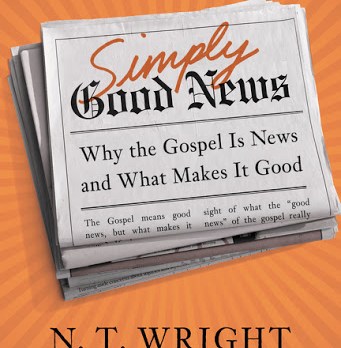If you’ve ever sat through a four-point sermon on how to defeat the devil during Lent, you will, upon reading Simply Good News by N. T. Wright, understand that you haven’t heard the gospel. What you heard was an exhortation on how to be a better Christian — but that’s not the gospel. Simply Good News gives us a corrective to inaccurate but popular conceptions of what, in fact, the gospel is.
N. T. Wright, a former bishop in the Anglican Church of England, is chair of New Testament and Early Christianity studies at the University of St. Andrews. He is widely regarded as one of the best biblical scholars living, and one of Christianity’s foremost apologists.
In his new book, Wright opens up the original content of the “good news,” and contrasts it with a lot of what has become “bad news.” He explains what Jesus and his later followers understood as Good News and does this by examining scripture, the historical context of the original message, and by linking the Good News back to the covenant God made with the Jews. The covenant history of Israel is crucial to understanding “good news” and makes no sense without it.
Sure, one should be leery of that word “original,” referring to the Gospel. It suggests an errant cult leader with one deviant eureka moment who deludes a few or many into thinking he has purged Christianity of its corruption, and he alone has now rediscovered the “true” faith.
Relax, that’s not Wright. He does, however, point us back to the understanding shared among the earliest Christians, particularly St. Paul, of how the term “good news” was intended and understood. It was very specific and far from its presently pinched and truncated meaning. But let’s start with what the Good News is not.
It is not, in Wright’s handling, an advice column on how to: be a better husband, wife, parent, or person. It does not tell us how to find salvation, get to heaven, or achieve eternal life. Even less is it about financial security, how to pray effectively for results, or read the Bible better. Those things, by Wright, are “advice,” maybe even “good advice,” but advice “isn’t the same thing as news. News is an announcement that something significant has happened. And good news is what Jesus and his followers were all about.”
The specific news that was good? Simple. The Lord God of Israel as Messiah suffered death and was raised from death. The Messiah now lives resurrected through time and eternity. St. Paul’s interpretation, says Wright, entails a specific message: “an event involving Jesus and a revelation of the one true God” makes everything different. The main aim of Jesus coming and dying in the first place wasn’t to get you into heaven; it was a step toward the restoration and transformation of all creation by a God capable of doing it for the creation he loves and the humanity he made.
This had immense consequences. In contrast to the many gods of the first-century world, “something had happened to Jesus: he had been raised from the dead. This disclosed a previously unexpected reality.”
It also presents an unexpected crisis. If true, all those gods are frauds, idols, poseurs. There is but “one God who deserved the name,” the God of Israel who raised the Lord Jesus Christ from death, and he is alive and active. This is the Good News. This is the crisis: “If this is the new reality, where do you stand in relation to it?”
In the first century, the Good News entailed a new way of living and thinking that accounted for the new reality. Whatever else that may mean, finding a new way of living and thinking, moving into the reality of Christ resurrected, is still not Gospel. Even less is the resurrection about going to heaven. No, the good news is that “the one true God has now taken charge of the world, in and through Jesus and his death and resurrection” [original emphasis]. This makes sense only within the deep context of Jewish hopes.
Wright assesses the reliability of the scriptural witness, especially surrounding the resurrection. As he did in The Resurrection of the Son of God — but with far fewer words — he manages to convey the utterly shattering surprise of the resurrection. What the people around Jesus most expected of him, turned out to be absolutely unexpected. The resurrection of Jesus, simply, “set[s] a new standard for our understanding of the way the world is.” Without the resurrection we’d be talking — if we were talking at all — about just another Jew done to death by the goyim. But the entire business of “good news” spins what is “real” off to something “more real.”
In later chapters Wright dissects “Distorted and Competing Gospels” — rationalism, Enlightenment materialism, and modernity. All these movements have their place but they each squeeze the Good News down to little more than private spirituality imposed by Western secularity.
His final chapter, “Praying the Good News,” is a provocative and, paradoxically, truly soothing series of brief meditations on the Our Father from the view of the Good News.
Who should read this book? Fans of Wright will want to grab it, of course. He reiterates themes he has previously addressed while still finding a fresh perspective. For anyone new to Wright’s work, this is a good place to begin. The theology is readily accessible, his analogies are clear, and the prose is reader-friendly. Oh, and pastors stuck preaching four-point instruction guides on how to defeat the devil (hint, Jesus already did it) will surely find new avenues for their homilitical efforts.
Russell E. Saltzman is a web columnist for First Things magazine. He lives in Kansas City, Missouri, and can be reached at russell.e.saltzman@gmail.com. His latest book is Speaking of the Dead.

